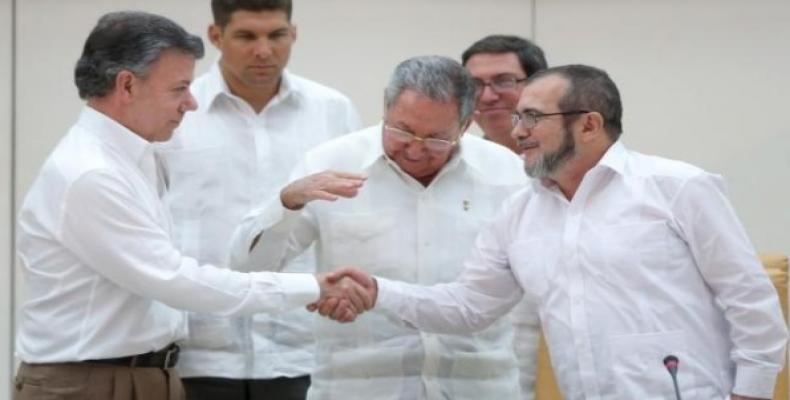Bogotá, November 26 (teleSUR-RHC)-- The Revolutionary Armed Forces of Colombia has agreed to a government proposal to change the format of negotiations during the final leg of peace talks in an effort to speed up negotiations and reach an agreement by the self-imposed deadline of March 23, 2016.
Timoleon Jimenez, head of the The Revolutionary Armed Forces of Colombia, known as the FARC, confirmed that the rebels had agreed to a proposal by President Juan Manuel Santos to hold a “conclave” of sorts during an interview published Tuesday.
Thus far, negotiations have been organized into “rounds” with negotiators taking breaks approximately every five days. The conclave would be similar to the process used by the Catholic Church to select a pope and would require negotiators from both sides to remain at the table as long as necessary.
Both parties are hopeful that the change in method will speed up the progress of talks. Hopes were raised that a final deal was at hand after a ceremony involving both Santos and Jimenez saw the pair meet in Cuba in September and sign a historic agreement regarding transitional justice.
In the interview, Jimenez, better known by his alias Timochenko, lamented that after that occasion talks seemed to hit a snag. He said: “We entered into a process of attrition at the negotiating table where there was no progress on anything.”
Despite the announcement regarding an agreement on transitional justice, there was still some last-minute haggling over the finer details of the agreement. This caused talks to be delayed by approximately two months, where other discussions on critical and sensitive topics were pushed back.
In response, the FARC leader said he personally wrote to Santos to see if a change could be made to overcome this setback. Santos chose to send his brother, who acted as the president's official envoy and presented the idea of a conclave.
Timochenko said the goal of changing the method of negotiations was to achieve results and expressed optimism a deal would be reached. "We are at a point where the process is practically irreversible, but only if both parties maintain the will (to reach a final deal),” said Timochenko.
The rebel leader said that the FARC certainly felt that the will was there on their part. Since September, the FARC has suspended the acquisition of weapons, ceased combat training in order to focus on political and cultural education and halted recruitment of new combatants.
“We are motivated by our interest in a final deal, to plant the seeds of peace in Colombia,” stated the FARC commander.
Timochenko said that he believed that President Santos also had the necessary political will to achieve a deal but that some of the president's advisers were creating obstacles.
He added that agreement on a number of important and sensitive topics, such as a bilateral cease-fire and the end of paramilitary activity in Colombia, was close.
According to the FARC leader, agreements on these remaining points is critical to not only ensuring a deal is reach but also ensuring another armed conflict does not break out.
"Colombia cannot bear another war ... Colombia deserves peace," said Timochenko.


